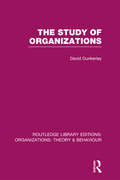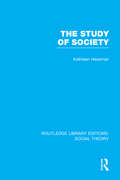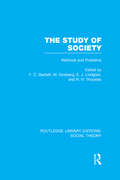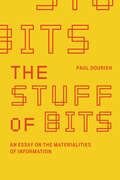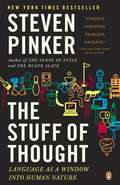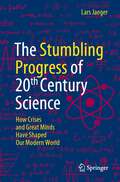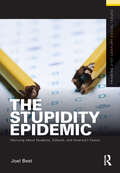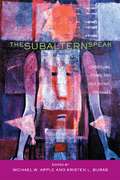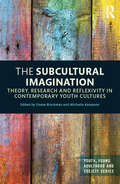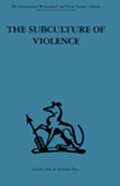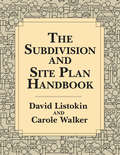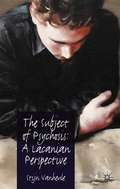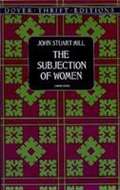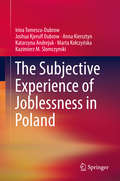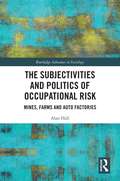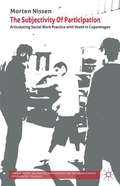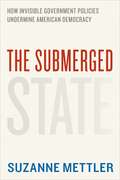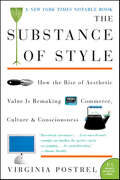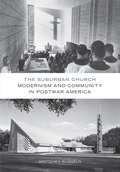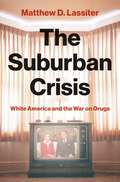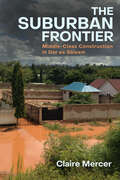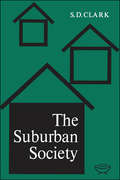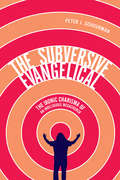- Table View
- List View
The Study of Organizations (Routledge Library Editions: Organizations)
by David DunkerleyIn this introduction for undergraduate students, the author surveys the development of the study of organizations from an historical point of view. He studies organizations within the framework of the main schools of thought, looks into the various levels of analysis involved, and considers the influence of the environment on the organization, particularly that of technology and of other organizations.
The Study of Society (Routledge Library Editions: Social Theory Ser.)
by Kathleen Joan HeasmanIn this book, Dr Heasman begins by stating some central questions and answers concerning sociology and how we are to set about studying society. It goes on to deal with family groupings and social differences; with education and the part it plays in socialization; with the meaning and the importance of social differences; and with the relative importance of work and leisure and the ways in which leisure can be used. It considers the effects of the change in the size of the population in the last hundred years upon social life in Britain, examines the problems of social change and looks at order in society and the way it is affected by different forms and aspects of government. The result is a thorough, comprehensive, but at all times lucid, introduction to the subject.
The Study of Society: Methods and Problems (Routledge Library Editions: Social Theory)
by F. C. BartlettThere is today widespread recognition of the fact that the future of human civilization depends to a high degree upon Man’s capacity to understand the forces and factors which control his own behaviour. Such understanding must be achieved, not only as regards individual conduct, but equally as regards the mass phenomena resulting from group contacts, which are becoming increasingly intimate and influential. Until this present volume, nowhere have the three sciences of sociology, psychology and social anthropology been properly mobilized to deal with the social problems which yearly grow more pressing. The essays in this book aim to address this.
The Stuff of Bits: An Essay on the Materialities of Information (The\mit Press Ser.)
by Paul DourishAn argument that the material arrangements of information—how it is represented and interpreted—matter significantly for our experience of information and information systems.Virtual entities that populate our digital experience, like e-books, virtual worlds, and online stores, are backed by the large-scale physical infrastructures of server farms, fiber optic cables, power plants, and microwave links. But another domain of material constraints also shapes digital living: the digital representations sketched on whiteboards, encoded into software, stored in databases, loaded into computer memory, and transmitted on networks. These digital representations encode aspects of our everyday world and make them available for digital processing. The limits and capacities of those representations carry significant consequences for digital society. In The Stuff of Bits, Paul Dourish examines the specific materialities that certain digital objects exhibit. He presents four case studies: emulation, the creation of a “virtual” computer inside another; digital spreadsheets and their role in organizational practice; relational databases and the issue of “the databaseable”; and the evolution of digital networking and the representational entailments of network protocols. These case studies demonstrate how a materialist account can offer an entry point to broader concerns—questions of power, policy, and polity in the realm of the digital.
The Stuff of Thought: Language as a Window into Human Nature
by Steven PinkerThis New York Times bestseller is an exciting and fearless investigation of language Bestselling author Steven Pinker possesses that rare combination of scientific aptitude and verbal eloquence that enables him to provide lucid explanations of deep and powerful ideas. His previous books?including the Pulitzer Prize finalist The Blank Slate?have catapulted him into the limelight as one of today?s most important popular science writers. In The Stuff of Thought, Pinker presents a fascinating look at how our words explain our nature. Considering scientific questions with examples from everyday life, The Stuff of Thought is a brilliantly crafted and highly readable work that will appeal to fans of everything from The Selfish Gene and Blink to Eats, Shoots & Leaves.
The Stumbling Progress of 20th Century Science: How Crises and Great Minds Have Shaped Our Modern World
by Lars JaegerThe 70 years from 1880 to 1950 witnessed the final ascent of humankind into the modern age. Historically, this period is characterized by deep political, social and economic crises. However, parallel to this and much less known in the public, rational scientific thinking also experienced the darkest and deepest crisis of its own history. All the great modern scientific discoveries like quantum theory, genetics and neurology are products of this. Ground-breaking discoveries, profound crises, revolutionary thoughts, refutation of previously unshakable beliefs - these years are marked by scientific achievements of numerous great minds, who overturned our understanding of the world, of space, time and infinity, of life, logic and calculability almost overnight. The "intuitive genius" of these pioneers still forms the foundation of today’s scientific thinking and technological progress. In fact, tackling and overcoming those deep scientific crises shaped our modern life like nothing else. The resulting reorientation of our understanding of nature and ourselves allowed ancient philosophical questions to appear in a new light: "What is reality?", "What can we know about the world?" or "What is man's place in nature?". The most exciting period in the history of science is retold here in an entertaining way.
The Stupidity Epidemic: Worrying About Students, Schools, and America’s Future (Framing 21st Century Social Issues)
by Joel BestCritics often warn that American schools are failing, and that our students are ill-prepared for the challenges the future holds, and may even be "the dumbest generation." We can think of these claims as warning about a Stupidity Epidemic. This essay begins by tracing the history of the idea of that American students, teachers, and schools are somehow getting worse; the record shows that critics have been issuing such warnings for more than 150 years. It then examines four sets of data that speak to whether educational deterioration is taking place. First, data on educational attainment show a clear trend: more students are getting more education. Second, standardized test scores suggest that American students are performing somewhat better; certainly most test scores do not indicate that students are getting worse. Third, measures of popular knowledge also show evidence of improvement. Fourth, there is clear evidence that IQ scores have been rising. In other words, the best available evidence fails to support claims about a Stupidity Epidemic. The essay then turns to exploring several reasons why belief in educational decline is so common, and concludes by suggesting some more useful ways to think about educational problems. The goal of this new, unique Series is to offer readable, teachable "thinking frames" on today’s social problems and social issues by leading scholars, all in short 60 page or shorter formats, and available for view on http://routledge.customgateway.com/routledge-social-issues.html For instructors teaching a wide range of courses in the social sciences, the Routledge Social Issues Collection now offers the best of both worlds: originally written short texts that provide "overviews" to important social issues as well as teachable excerpts from larger works previously published by Routledge and other presses.
The Subaltern Speak: Curriculum, Power, and Educational Struggles
by Michael W. Apple Kristen L. BurasThe question of whose perspective, experience and history is privileged in educational institutions has shaped curriculum debates for decades. In this insightful collection, Michael W. Apple and Kristen L. Buras interrogate the notion that some knowledge is worth more than others. The Subaltern Speak combines an analysis of the ways in which various forms of power now operate, with a specific focus on spaces in which subaltern groups act to reassert their own perceived identities, cultures and histories.
The Subcultural Imagination: Theory, Research and Reflexivity in Contemporary Youth Cultures (Youth, Young Adulthood and Society)
by Shane Blackman Michelle KempsonThe Subcultural Imagination discusses young adults in subcultures and examines how sociologists use qualitative research methods to study them. Through the application of the ideas of C. Wright Mills to the development of theory-reflexive ethnography, this book analyses the experiences of young people in different subcultural settings, as well as reflecting on how young people in subcultures interact in the wider context of society, biography and history. From Cuba to London, and Bulgaria to Asia, this book delves into urban spaces and street corners, young people’s parties, gigs, BDSM fetish clubs, school, the home, and feminist zines to offer a picture of live sociology in practice. In three parts, the volume explores: history, biography and subculture; practising reflexivity in the field; epistemologies, pedagogies and the subcultural subject. The book offers cutting edge theory and rich empirical research on social class, gender and ethnicities from both established and new researchers across diverse disciplinary backgrounds. It moves the subcultural debate beyond the impasse of the term’s relevance, to one where researchers are fully engaged with the lives of the subcultural subjects. This innovative edited collection will appeal to scholars and students in the areas of sociology, youth studies, media and cultural studies/communication, research methods and ethnography, popular music studies, criminology, politics, social and cultural theory, and gender studies.
The Subculture of Violence: Towards an Integrated Theory in Criminology
by Marvin E. Wolfgang Franco FerracutiTavistock Press was established as a co-operative venture between the Tavistock Institute and Routledge & Kegan Paul (RKP) in the 1950s to produce a series of major contributions across the social sciences. This volume is part of a 2001 reissue of a selection of those important works which have since gone out of print, or are difficult to locate. Published by Routledge, 112 volumes in total are being brought together under the name The International Behavioural and Social Sciences Library: Classics from the Tavistock Press. Reproduced here in facsimile, this volume was originally published in 1967 and is available individually. The collection is also available in a number of themed mini-sets of between 5 and 13 volumes, or as a complete collection.
The Subdivision and Site Plan Handbook
by David Listokin Carole WalkerThe Supreme Court decision that property owners may be entitled to compensation for government regulations that deprive them of reasonable use of their property has thrown the land-use field into a state of turmoil. Will municipal land-use ordinances be found excessive? What regulations can be considered a reasonable exercise of police power for public health, safety, and welfare? Will municipalities be liable for compensation to property owners if development is restricted? How can municipalities and developers plan in the wake of this decision?Ordinance provisions cover components of subdivision regulation: general provisions, definitions, administration, procedure, design and improvements, off-tract improvements, and documents to be submitted. The Subdivision and Site Plan Handbook provides a narrative on the background, rationale, and intent of each requirement accompanying the model ordinance; gives an overview of the history of subdivision regulation in the United States; traces the evolution of land-use regulation through various stages; and presents the legal context for present-day regulation.The book has been designed for use by government administrators, developers, planners, attorneys, and others interested in land-use regulation. The model ordinance represents the most current thinking about land use and site control and responds to questions raised by the Supreme Court decision. David Listokin and Carole Walker's analyses are flexible, efficient, responsive to local conditions, and balance regulatory costs and benefits.
The Subject of Human Being (Routledge Studies in Critical Realism)
by Christopher W. HaleyThe Subject of Human Being presents a sweeping account of the nature of human existence. As a work of philosophical anthropology, the analysis ranges from the basic powers emerging from the mind, to our extraordinary psychological capacities, to the shared sociocultural worlds we inhabit. The book integrates different perspectives on social ontology from a selection of philosophers and theorists, whose advances toward understanding the relationship between individuals and society ought to revolutionize social theory as understood and practiced in the social sciences and humanities. Although grounded in critical realist philosophy of Roy Bhaskar and the social theory of Margaret Archer, the book also draws from philosophy of mind, phenomenology of consciousness, psychoanalytic theory, virtue ethics, and personalism to support and extend its arguments. Four elements of human existence are examined: the nature of consciousness, agency, subjectivity, and the social world. Thus, it addresses related issues of power, the agent-structure problem, the formation of beliefs and desires, human universals, and human rights. Portraying a unified social theory that is materialist, realist, dialectical, and centered on emergence, and offering a comprehensive and progressive theory of human being, this book is essential reading for students and scholars of critical realism, philosophy, and the social sciences.
The Subject of Psychosis: A Lacanian Perspective
by Stijn VanheuleThis book discusses what Jacques Lacan's oeuvre contributes to our understanding of psychosis. Presenting a close reading of original texts, Stijn Vanheule proposes that Lacan's work on psychosis can best be framed in terms of four broad periods.
The Subjection of Women
by John Stuart MillThe philosopher argues for equality in legal, political, social and domestic relations between men and women. Carefully reasoned and clearly expressed with logic and consistency, the work remains a landmark in the important struggle for human rights.
The Subjective Experience of Joblessness in Poland
by Irina Tomescu-Dubrow Joshua Kjerulf Dubrow Anna Kiersztyn Katarzyna Andrejuk Marta Kołczyńska Kazimierz M. SlomczynskiThis book describes the experience of joblessness and unemployment in contemporary Poland. It does so by combining qualitative and quantitative data from a special project conducted in Poland after the Great Recession and the long-term Polish Panel Survey (POLPAN) to describe the lives of the jobless: women and men currently out of work, the recently re-employed, and housewives. The book uses a class and inequality perspective to investigate how these women and men became jobless, how they look for and find employment, their household and social activities, and their political participation. It contextualizes these experiences with a description of Poland’s economy, labor market and employment policies after the fall of Communism and builds on the active interviewing and social constructionist approaches to explore the complex interviewer-respondent relationship.
The Subjectivities and Politics of Occupational Risk: Mines, Farms and Auto Factories (Routledge Advances in Sociology)
by Alan HallThe Subjectivities and Politics of Occupational Risk links restructuring in three industries to shifts in risk subjectivities and politics, both within workplaces and within the safety management and regulative spheres, often leading to conflict and changes in law, political discourses and management approaches. The state and corporate governance emphasis on worker participation and worker rights, internal responsibility, and self-regulative technologies are understood as corporate and state efforts to reconstruct control and responsibility for Occupational Health and Safety (OHS) risks within the context of a globalized neoliberal economy. Part 1 presents a conceptual framework for understanding the subjective bases of worker responses to health and safety hazards using Bourdieu’s concept of habitus and the sociology of risk concepts of trust and uncertainty. Part 2 demonstrates the restructuring arguments using three different industry case studies of multiple mines, farms and auto parts plants. The final chapter draws out the implications of the evidence and theory for social change and presents several recommendations for a more worker-centred politics of health and safety. The book will appeal to social scientists interested in health and safety, work, employment relations and labour law, as well as worker advocates and activists.
The Subjectivity of Participation
by Morten NissenWhat is a 'we' a collective and how can we use such communal self-knowledge to help people? This book is about collectivity, participation, and subjectivity and about the social theories that may help us understand these matters. It also seeks to learn from the innovative practices and ideas of a community of social/youth workers in Copenhagen between 1987 and 2003, who developed a pedagogy through creating collectives and mobilizing young people as participants. The theoretical and practical traditions are combined in a unique methodology viewing research as a contentious modeling of prototypical practices. Through this dialogue, it develops an original trans-disciplinary critical theory and practice of collective subjectivity for which the ongoing construction and overcoming of common sense, or ideology, is central. It also points to ways of relating discourse with agency, and fertilizing insights from interactionism and ideology theories in a cultural-historical framework.
The Submerged State
by Suzanne Mettler“Keep your government hands off my Medicare!” Such comments spotlight a central question animating Suzanne Mettler’s provocative and timely book: why are many Americans unaware of government social benefits and so hostile to them in principle, even though they receive them? The Obama administration has been roundly criticized for its inability to convey how much it has accomplished for ordinary citizens. Mettler argues that this difficulty is not merely a failure of communication; rather it is endemic to the formidable presence of the “submerged state. ” In recent decades, federal policymakers have increasingly shunned the outright disbursing of benefits to individuals and families and favored instead less visible and more indirect incentives and subsidies, from tax breaks to payments for services to private companies. These submerged policies, Mettler shows, obscure the role of government and exaggerate that of the market. As a result, citizens are unaware not only of the benefits they receive, but of the massive advantages given to powerful interests, such as insurance companies and the financial industry. Neither do they realize that the policies of the submerged state shower their largest benefits on the most affluent Americans, exacerbating inequality. Mettler analyzes three Obama reforms—student aid, tax relief, and health care—to reveal the submerged state and its consequences, demonstrating how structurally difficult it is to enact policy reforms and even to obtain public recognition for achieving them. She concludes with recommendations for reform to help make hidden policies more visible and governance more comprehensible to all Americans. The sad truth is that many American citizens do not know how major social programs work—or even whether they benefit from them. Suzanne Mettler’s important new book will bring government policies back to the surface and encourage citizens to reclaim their voice in the political process.
The Substance of Style: How the Rise of Aesthetic Value Is Remaking Commerce, Culture, and Consciousness
by Virginia PostrelWhether it's sleek leather pants, a shiny new Apple computer, or a designer toaster, we make important decisions as consumers every day based on our sensory experience. Sensory appeals are everywhere, and they are intensifying, radically changing how Americans live and work. The twenty-first century has become the age of aesthetics, and whether we realize it or not, this influence has taken over the marketplace, and much more.In this penetrating, keenly observed book, Virginia Postrel makes the argument that appearance counts, that aesthetic value is real. Drawing from fields as diverse as fashion, real estate, politics, design, and economics, Postrel deftly chronicles our culture's aesthetic imperative and argues persuasively that it is a vital component of a healthy, forward-looking society.Intelligent, incisive, and thought-provoking, The Substance of Style is a groundbreaking portrait of the democratization of taste and a brilliant examination of the way we live now.
The Suburban Church: Modernism and Community in Postwar America (Architecture, Landscape and Amer Culture)
by Gretchen BuggelnAfter World War II, America&’s religious denominations spent billions on church architecture as they spread into the suburbs. In this richly illustrated history of midcentury modern churches in the Midwest, Gretchen Buggeln shows how architects and suburban congregations joined forces to work out a vision of how modernist churches might help reinvigorate Protestant worship and community. The result is a fascinating new perspective on postwar architecture, religion, and society.Drawing on the architectural record, church archives, and oral histories, The Suburban Church focuses on collaborations between architects Edward D. Dart, Edward A. Sövik, Charles E. Stade, and seventy-five congregations. By telling the stories behind their modernist churches, the book describes how the buildings both reflected and shaped developments in postwar religion—its ecumenism, optimism, and liturgical innovation, as well as its fears about staying relevant during a time of vast cultural, social, and demographic change.While many scholars have characterized these congregations as &“country club&” churches, The Suburban Church argues that most were earnest, well-intentioned religious communities caught between the desire to serve God and the demands of a suburban milieu in which serving middle-class families required most of their material and spiritual resources.
The Suburban Crisis: White America and the War on Drugs
by Matthew D. LassiterHow the drug war transformed American political cultureSince the 1950s, the American war on drugs has positioned white middle-class youth as sympathetic victims of illegal drug markets who need rehabilitation instead of incarceration whenever they break the law. The Suburban Crisis traces how politicians, the media, and grassroots political activists crusaded to protect white families from perceived threats while criminalizing and incarcerating urban minorities, and how a troubling legacy of racial injustice continues to inform the war on drugs today.In this incisive political history, Matthew Lassiter shows how the category of the “white middle-class victim” has been as central to the politics and culture of the drug war as racial stereotypes like the “foreign trafficker,” “urban pusher,” and “predatory ghetto addict.” He describes how the futile mission to safeguard and control white suburban youth shaped the enactment of the nation’s first mandatory-minimum drug laws in the 1950s, and how soaring marijuana arrests of white Americans led to demands to refocus on “real criminals” in inner cities. The 1980s brought “just say no” moralizing in the white suburbs and militarized crackdowns in urban centers.The Suburban Crisis reveals how the escalating drug war merged punitive law enforcement and coercive public health into a discriminatory system for the social control of teenagers and young adults, and how liberal and conservative lawmakers alike pursued an agenda of racialized criminalization.
The Suburban Frontier: Middle-Class Construction in Dar es Salaam
by Claire MercerA free ebook version of this title is available through Luminos, University of California Press’s Open Access publishing program. Visit www.luminosoa.org to learn more. African cities are under construction. Beyond the urban redevelopment schemes and large-scale infrastructure projects reconfiguring central city skylines, urban residents are putting their resources into finding land and building homes on city edges. The Suburban Frontier examines how self-built housing on the urban periphery has become central to middle-class formation and urban transformation in contemporary Tanzania. Drawing on original research in the city of Dar es Salaam, Claire Mercer details how the "suburban frontier" has become the place where Africa’s middle classes are shaped. As the first book-length analysis of Africa’s suburban middle class, The Suburban Frontier offers significant contributions to the study of urban social change in Africa and urbanization in the Global South.
The Suburban Society
by S. D. ClarkBy questioning the widely accepted picture of suburban society which has been developed by many sociologists, social psychologists, and other serious students of social science, as well as by popular writers, this book will challenge much of our thinking about certain trends and developments in present-day society. The author, a distinguished Canadian sociologist, shows that there is no essential difference between the new society of the suburbs and any other new society in terms of the kind of forces which produced it. The suburban societies so far studied, he maintains, have been selected because they conform to the existing stereotype, and so the myths have been perpetuated.Professor Clark pays special attention to the mass-developed suburbs. He shows that most suburban dwellers live in areas undergoing mass development, and that in such areas none of the characteristics commonly attributed to suburbia are to be found. The people who have moved to the suburbs in such large numbers are not, the author claims, "other directed" as Riesman would maintain, or "organization men" as Whyte has called them. They were, rather, mainly interested in finding houses to live in, having been forced out of the city in search of living space. By examining a number of suburban areas around Toronto, Professor Clark shows how the suburban society developed from crude beginnings, lacking almost all the attributes of a society, to a society largely urban in character.
The Subversive Evangelical: The Ironic Charisma of an Irreligious Megachurch (Advancing Studies in Religion Series #6)
by Peter J. SchuurmanEvangelicals have been scandalized by their association with Donald Trump, their megachurches summarily dismissed as “religious Walmarts.” In The Subversive Evangelical Peter Schuurman shows how a growing group of “reflexive evangelicals” use irony to critique their own tradition and distinguish themselves from the stereotype of right-wing evangelicalism. Entering the Meeting House – an Ontario-based Anabaptist megachurch – as a participant observer, Schuurman discovers that the marketing is clever and the venue (a rented movie theatre) is attractive to the more than five thousand weekly attendees. But the heart of the church is its charismatic leader, Bruxy Cavey, whose anti-religious teaching and ironic tattoos offer a fresh image for evangelicals. This charisma, Schuurman argues, is not just the power of one individual; it is a dramatic production in which Cavey, his staff, and attendees cooperate, cultivating an identity as an “irreligious” megachurch and providing followers with a more culturally acceptable way to practise their faith in a secular age. Going behind the scenes to small group meetings, church dance parties, and the homes of attendees to investigate what motivates these reflexive evangelicals, Schuurman reveals a playful and provocative counterculture that distances itself from prevailing stereotypes while still embracing a conservative Christian faith.
The Subversive Evangelical: The Ironic Charisma of an Irreligious Megachurch (Advancing Studies in Religion)
by Peter J. SchuurmanEvangelicals have been scandalized by their association with Donald Trump, their megachurches summarily dismissed as “religious Walmarts.” In The Subversive Evangelical Peter Schuurman shows how a growing group of “reflexive evangelicals” use irony to critique their own tradition and distinguish themselves from the stereotype of right-wing evangelicalism. Entering the Meeting House – an Ontario-based Anabaptist megachurch – as a participant observer, Schuurman discovers that the marketing is clever and the venue (a rented movie theatre) is attractive to the more than five thousand weekly attendees. But the heart of the church is its charismatic leader, Bruxy Cavey, whose anti-religious teaching and ironic tattoos offer a fresh image for evangelicals. This charisma, Schuurman argues, is not just the power of one individual; it is a dramatic production in which Cavey, his staff, and attendees cooperate, cultivating an identity as an “irreligious” megachurch and providing followers with a more culturally acceptable way to practise their faith in a secular age. Going behind the scenes to small group meetings, church dance parties, and the homes of attendees to investigate what motivates these reflexive evangelicals, Schuurman reveals a playful and provocative counterculture that distances itself from prevailing stereotypes while still embracing a conservative Christian faith.
